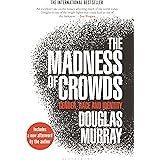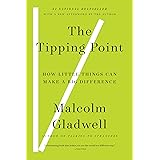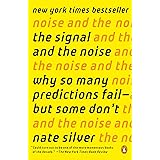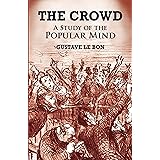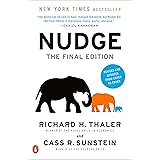
Enjoy fast, free delivery, exclusive deals, and award-winning movies & TV shows with Prime
Try Prime
and start saving today with fast, free delivery
Amazon Prime includes:
Fast, FREE Delivery is available to Prime members. To join, select "Try Amazon Prime and start saving today with Fast, FREE Delivery" below the Add to Cart button.
Amazon Prime members enjoy:- Cardmembers earn 5% Back at Amazon.com with a Prime Credit Card.
- Unlimited Free Two-Day Delivery
- Streaming of thousands of movies and TV shows with limited ads on Prime Video.
- A Kindle book to borrow for free each month - with no due dates
- Listen to over 2 million songs and hundreds of playlists
- Unlimited photo storage with anywhere access
Important: Your credit card will NOT be charged when you start your free trial or if you cancel during the trial period. If you're happy with Amazon Prime, do nothing. At the end of the free trial, your membership will automatically upgrade to a monthly membership.
Buy new:
-35% $11.63$11.63
Ships from: Amazon.com Sold by: Amazon.com
Save with Used - Acceptable
$7.96$7.96
Ships from: Amazon Sold by: Goodbooks Company

Download the free Kindle app and start reading Kindle books instantly on your smartphone, tablet, or computer - no Kindle device required.
Read instantly on your browser with Kindle for Web.
Using your mobile phone camera - scan the code below and download the Kindle app.

OK
Image Unavailable
Color:
-

-
-
- To view this video download Flash Player
 Audible sample Sample
Audible sample Sample 


The Wisdom of Crowds Paperback – August 16, 2005
Purchase options and add-ons
In this fascinating book, New Yorker business columnist James Surowiecki explores a deceptively simple idea: Large groups of people are smarter than an elite few, no matter how brilliant—better at solving problems, fostering innovation, coming to wise decisions, even predicting the future.
With boundless erudition and in delightfully clear prose, Surowiecki ranges across fields as diverse as popular culture, psychology, ant biology, behavioral economics, artificial intelligence, military history, and politics to show how this simple idea offers important lessons for how we live our lives, select our leaders, run our companies, and think about our world.
- Print length336 pages
- LanguageEnglish
- PublisherAnchor
- Publication dateAugust 16, 2005
- Dimensions5.2 x 0.7 x 8 inches
- ISBN-100385721706
- ISBN-13978-0385721707
Books with Buzz
Discover the latest buzz-worthy books, from mysteries and romance to humor and nonfiction. Explore more
Frequently bought together
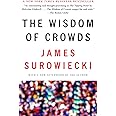
Similar items that may deliver to you quickly
Editorial Reviews
From Publishers Weekly
Copyright © Reed Business Information, a division of Reed Elsevier Inc. All rights reserved.
Review
“Drawing from biology, behavioral economics, and computer science, Surowiecki offers answers to such timeless–and often rhetorical–questions as “Why does the line you’re standing in always seem to move the slowest?” and “Why is there so much garbage on TV?” The result is a highly original set of conclusions about how our world works.” –Seed Magazine“As readers of Surowiecki’s writings in The New Yorker will know, he has a rare gift for combining rigorous thought with entertaining example. [The Wisdom of Crowds] is packed with amusing ideas that leave the reader feeling better-educated.” –Financial Times (London)“The book is deeply researched and well-written, and the result is a fascinating read.” –Deseret Morning News"Jim Surowiecki has done the near impossible. He's taken what in other hands would be a dense and difficult subject and given us a book that is engaging, surprising, and utterly persuasive. The Wisdom of Crowds will change the way you think about markets, economics, and a large swatch of everyday life." –Joe Nocera, editorial director of Fortune magazine and author of A Piece of the Action “Makes a compelling case.” –The Gazette (Montreal)“Deftly compressing a small library’s worth of research into a single slim and readable volume, the Financial Page columnist at The New Yorker makes his bid to capture the zeitgeist as his colleague Malcolm Gladwell did with The Tipping Point. . . . The author has produced something surprising and new: a sociological tract as gripping as a good novel.” –Best Life“Surowiecki is a patient and vivid writer with a knack for telling examples.” –Denver Post "Most crowds of readers would agree that Jim Surowiecki is one of the most interesting journalists working today. Now he has written a book that will exceed even their expectations. Anyone open to re-thinking their most basic assumptions–people who enjoyed The Tipping Point, say–will love this book." –Michael Lewis, author of Moneyball
“Surowiecki’s is a big-idea book.” –Salon.com"It has become increasingly recognized that the average opinions of groups is frequently more accurate than most individuals in the group. The author has written a most interesting survey of the many studies in this area and discussed the limits as well as the achievements of self-organization." –Kenneth Arrow, winner of the Nobel Prize in Economics and Professor of Economics (Emeritus), Stanford University“Clever and surprising.... The originality and sheer number of demonstrations of the impressive power of collective thinking provided here are fascinating, and oddly comforting.” –Bookforum“An illuminating book.” –Detroit Free Press
From the Back Cover
With boundless erudition and in delightfully clear prose, Surowiecki ranges across fields as diverse as popular culture, psychology, ant biology, behavioral economics, artificial intelligence, military history, and politics to show how this simple idea offers important lessons for how we live our lives, select our leaders, run our companies, and think about our world.
About the Author
James Surowiecki is a staff writer at The New Yorker, where he writes the popular business column, “The Financial Page.” His work has appeared in a wide range of publications, including the New York Times, the Wall Street Journal, Artforum, Wired, and Slate. He lives in Brooklyn, New York.
www.wisdomofcrowds.com
Excerpt. © Reprinted by permission. All rights reserved.
I
If, years hence, people remember anything about the TV game show Who Wants to Be a Millionaire?, they will probably remember the contestants' panicked phone calls to friends and relatives. Or they may have a faint memory of that short-lived moment when Regis Philbin became a fashion icon for his willingness to wear a dark blue tie with a dark blue shirt. What people probably won't remember is that every week Who Wants to Be a Millionaire? pitted group intelligence against individual intelligence, and that every week, group intelligence won.
Who Wants to Be a Millionaire? was a simple show in terms of structure: a contestant was asked multiple-choice questions, which got successively more difficult, and if she answered fifteen questions in a row correctly, she walked away with $1 million. The show's gimmick was that if a contestant got stumped by a question, she could pursue three avenues of assistance. First, she could have two of the four multiple-choice answers removed (so she'd have at least a fifty-fifty shot at the right response). Second, she could place a call to a friend or relative, a person whom, before the show, she had singled out as one of the smartest people she knew, and ask him or her for the answer. And third, she could poll the studio audience, which would immediately cast its votes by computer. Everything we think we know about intelligence suggests that the smart individual would offer the most help. And, in fact, the "experts" did okay, offering the right answer--under pressure--almost 65 percent of the time. But they paled in comparison to the audiences. Those random crowds of people with nothing better to do on a weekday afternoon than sit in a TV studio picked the right answer 91 percent of the time.
Now, the results of Who Wants to Be a Millionaire? would never stand up to scientific scrutiny. We don't know how smart the experts were, so we don't know how impressive outperforming them was. And since the experts and the audiences didn't always answer the same questions, it's possible, though not likely, that the audiences were asked easier questions. Even so, it's hard to resist the thought that the success of the Millionaire audience was a modern example of the same phenomenon that Francis Galton caught a glimpse of a century ago.
As it happens, the possibilities of group intelligence, at least when it came to judging questions of fact, were demonstrated by a host of experiments conducted by American sociologists and psychologists between 1920 and the mid-1950s, the heyday of research into group dynamics. Although in general, as we'll see, the bigger the crowd the better, the groups in most of these early
experiments--which for some reason remained relatively unknown outside of academia--were relatively small. Yet they nonetheless performed very well. The Columbia sociologist Hazel Knight kicked things off with a series of studies in the early 1920s, the first of which had the virtue of simplicity. In that study Knight asked the students in her class to estimate the room's temperature, and then took a simple average of the estimates. The group guessed 72.4 degrees, while the actual temperature was 72 degrees. This was not, to be sure, the most auspicious beginning, since classroom temperatures are so stable that it's hard to imagine a class's estimate being too far off base. But in the years that followed, far more convincing evidence emerged, as students and soldiers across America were subjected to a barrage of puzzles, intelligence tests, and word games. The sociologist Kate H. Gordon asked two hundred students to rank items by weight, and found that the group's "estimate" was 94 percent accurate, which was better than all but five of the individual guesses. In another experiment students were asked to look at ten piles of buckshot--each a slightly different size than the rest--that had been glued to a piece of white cardboard, and rank them by size. This time, the group's guess was 94.5 percent accurate. A classic demonstration of group intelligence is the jelly-beans-in-the-jar experiment, in which invariably the group's estimate is superior to the vast majority of the individual guesses. When finance professor Jack Treynor ran the experiment in his class with a jar that held 850 beans, the group estimate was 871. Only one of the fifty-six people in the class made a better guess.
There are two lessons to draw from these experiments. First, in most of them the members of the group were not talking to each other or working on a problem together. They were making individual guesses, which were aggregated and then averaged. This is exactly what Galton did, and it is likely to produce excellent results. (In a later chapter, we'll see how having members interact changes things, sometimes for the better, sometimes for the worse.) Second, the group's guess will not be better than that of every single person in the group each time. In many (perhaps most) cases, there will be a few people who do better than the group. This is, in some sense, a good thing, since especially in situations where there is an incentive for doing well (like, say, the stock market) it gives people reason to keep participating. But there is no evidence in these studies that certain people consistently outperform the group. In other words, if you run ten different jelly-bean-counting experiments, it's likely that each time one or two students will outperform the group. But they will not be the same students each time. Over the ten experiments, the group's performance will almost certainly be the best possible. The simplest way to get reliably good answers is just to ask the group each time.
A similarly blunt approach also seems to work when wrestling with other kinds of problems. The theoretical physicist Norman L. Johnson has demonstrated this using computer simulations of individual "agents" making their way through a maze. Johnson, who does his work at the Los Alamos National Laboratory, was interested in understanding how groups might be able to solve problems that individuals on their own found difficult. So he built a maze--one that could be navigated via many different paths, some shorter, and some longer--and sent a group of agents into the maze one by one. The first time through, they just wandered around, the way you would if you were looking for a particular cafe* in a city where you'd never been before. Whenever they came to a turning point--what Johnson called a "node"--they would randomly choose to go right or left. Therefore some people found their way, by chance, to the exit quickly, others more slowly. Then Johnson sent the agents back into the maze, but this time he allowed them to use the information they'd learned on their first trip, as if they'd dropped bread crumbs behind them the first time around. Johnson wanted to know how well his agents would use their new information. Predictably enough, they used it well, and were much smarter the second time through. The average agent took 34.3 steps to find the exit the first time, and just 12.8 steps to find it the second.
The key to the experiment, though, was this: Johnson took the results of all the trips through the maze and used them to calculate what he called the group's "collective solution." He figured out what a majority of the group did at each node of the maze, and then plotted a path through the maze based on the majority's decisions. (If more people turned left than right at a given node, that was the direction he assumed the group took. Tie votes were broken randomly.) The group's path was just nine steps long, which was not only shorter than the path of the average individual (12.8 steps), but as short as the path that even the smartest individual had been able to come up with. It was also as good an answer as you could find. There was no way to get through the maze in fewer than nine steps, so the group had discovered the optimal solution. The obvious question that follows, though, is: The judgment of crowds may be good in laboratory settings and classrooms, but what happens in the real world?
II
At 11:38 am on January 28, 1986, the space shuttle Challenger lifted off from its launch pad at Cape Canaveral. Seventy-four seconds later, it was ten miles high and rising. Then it blew up. The launch was televised, so news of the accident spread quickly. Eight minutes after the explosion, the first story hit the Dow Jones News Wire.
The stock market did not pause to mourn. Within minutes, investors started dumping the stocks of the four major contractors who had participated in the Challenger launch: Rockwell International, which built the shuttle and its main engines; Lockheed, which managed ground support; Martin Marietta, which manufactured the ship's external fuel tank; and Morton Thiokol, which built the solid-fuel booster rocket. Twenty-one minutes after the explosion, Lockheed's stock was down 5 percent, Martin Marietta's was down 3 percent, and Rockwell was down 6 percent.
Morton Thiokol's stock was hit hardest of all. As the finance professors Michael T. Maloney and J. Harold Mulherin report in their fascinating study of the market's reaction to the Challenger disaster, so many investors were trying to sell Thiokol stock and so few people were interested in buying it that a trading halt was called almost immediately. When the stock started trading again, almost an hour after the explosion, it was down 6 percent. By the end of the day, its decline had almost doubled, so that at market close, Thiokol's stock was down nearly 12 percent. By contrast, the stocks of the three other firms started to creep back up, and by the end of the day their value had fallen only around 3 percent.
What this means is that the stock market had, almost immediately, labeled Morton Thiokol as the company that was responsible for the Challenger disaster. The stock market is, at least in theory, a machine for calculating the present value of all the "free cash flow" a company will earn in the future. (Free cash flow is the money that's left over after a company has paid all its bills and its taxes, has accounted for depreciation, and has invested in the business. It's the money you'd get to take home and put in the bank if you were the sole owner of the company.) The steep decline in Thiokol's stock price--especially compared with the slight declines in the stock prices of its competitors--was an unmistakable sign that investors believed that Thiokol was responsible, and that the consequences for its bottom line would be severe.
As Maloney and Mulherin point out, though, on the day of the disaster there were no public comments singling out Thiokol as the guilty party. While the New York Times article on the disaster that appeared the next morning did mention two rumors that had been making the rounds, neither of the rumors implicated Thiokol, and the Times declared, "There are no clues to the cause of the accident."
Regardless, the market was right. Six months after the explosion, the Presidential Commission on the Challenger revealed that the O-ring seals on the booster rockets made by Thiokol--seals that were supposed to prevent hot exhaust gases from escaping--became less resilient in cold weather, creating gaps that allowed the gases to leak out. (The physicist Richard Feynman famously demonstrated this at a congressional hearing by dropping an O-ring in a glass of ice water. When he pulled it out, the drop in temperature had made it brittle.) In the case of the Challenger, the hot gases had escaped and burned into the main fuel tank, causing the cataclysmic explosion. Thiokol was held liable for the accident. The other companies were exonerated.
In other words, within a half hour of the shuttle blowing up, the stock market knew what company was responsible. To be sure, this was a single event, and it's possible that the market's singling out of Thiokol was just luck. Or perhaps the company's business seemed especially susceptible to a downturn in the space program. Possibly the trading halt had sent a signal to investors to be wary. These all are important cautions, but there is still something eerie about what the market did. That's especially true because in this case the stock market was working as a pure weighing machine, undistorted by the factors--media speculation, momentum trading, and Wall Street hype--that make it a peculiarly erratic mechanism for aggregating the collective wisdom of investors. That day, it was just buyers and sellers trying to figure out what happened and getting it right.
How did they get it right? That's the question that Maloney and Mulherin found so vexing. First, they looked at the records of insider trades to see if Thiokol executives, who might have known that their company was responsible, had dumped stock on January 28. They hadn't. Nor had executives at Thiokol's competitors, who might have heard about the O-rings and sold Thiokol's stock short. There was no evidence that anyone had dumped Thiokol stock while buying the stocks of the other three contractors (which would have been the logical trade for someone with inside information). Savvy insiders alone did not cause that first-day drop in Thiokol's price. It was all those investors--most of them relatively uninformed--who simply refused to buy the stock.
But why did they not want Thiokol's stock? Maloney and Mulherin were finally unable to come up with a convincing answer to that question. In the end, they assumed that insider information was responsible for the fall in Thiokol's price, but they could not explain how. Tellingly, they quoted the Cornell economist Maureen O'Hara, who has said, "While markets appear to work in practice, we are not sure how they work in theory."
Maybe. But it depends on what you mean by "theory." If you strip the story down to its basics, after all, what happened that January day was this: a large group of individuals (the actual and potential shareholders of Thiokol's stock, and the stocks of its competitors) was asked a question--"How much less are these four companies worth now that the Challenger has exploded?"--that had an objectively correct answer. Those are conditions under which a crowd's average estimate--which is, dollar weighted, what a stock price is--is likely to be accurate. Perhaps someone did, in fact, have inside knowledge of what had happened to the O-rings. But even if no one did, it's plausible that once you aggregated all the bits of information about the explosion that all the traders in the market had in their heads that day, it added up to something close to the truth. As was true of those who helped John Craven find the Scorpion, even if none of the traders was sure that Thiokol was responsible, collectively they were certain it was.
Product details
- Publisher : Anchor; Reprint edition (August 16, 2005)
- Language : English
- Paperback : 336 pages
- ISBN-10 : 0385721706
- ISBN-13 : 978-0385721707
- Item Weight : 8.8 ounces
- Dimensions : 5.2 x 0.7 x 8 inches
- Best Sellers Rank: #42,367 in Books (See Top 100 in Books)
- #30 in Sociology of Social Theory
- #56 in Marketing & Consumer Behavior
- #82 in Economic History (Books)
- Customer Reviews:
About the author

SUROWIECKI is a staff writer at The New Yorker, where he writes the popular business column, 'The Financial Page.' His work has appeared in a wide range of publications, including the New York Times, the Wall Street Journal, Artforum, Wired, and Slate. He lives in Brooklyn, New York.
Customer reviews
Customer Reviews, including Product Star Ratings help customers to learn more about the product and decide whether it is the right product for them.
To calculate the overall star rating and percentage breakdown by star, we don’t use a simple average. Instead, our system considers things like how recent a review is and if the reviewer bought the item on Amazon. It also analyzed reviews to verify trustworthiness.
Learn more how customers reviews work on Amazon-
Top reviews
Top reviews from the United States
There was a problem filtering reviews right now. Please try again later.
In the simplest example, Francis Galton, a British scientist, attended a country fair. He was curious in a weight-guessing contest to see how close the average of all guesses came in assessing the weight of an ox after it had been slaughtered and dressed. The meat was the prize for the closest estimate. He expected that the average of the 787 legible submissions would be considerably off the mark, because many people with no expertise whatsoever were participating in the hopes of winning.
"Many non-experts competed," Galton wrote... in the scientific journal Nature, "like clerks and others who have no expert knowledge of horses, but who bet on races, guided by newspapers, friends, and their own fancies." The analogy to a democracy, in which people of radically different abilities and interests each get one vote, had suggested itself to Galton immediately. "The average competitor was probably as well fitted for making a just estimate of the dressed weight of the ox as an average voter is of judging the merits of most political issues on which he votes," he wrote. (p. xii)
The average of all guesses was 1,197 pounds and the ox weighed 1,198 pounds.
Surowiecki notes that many have expressed serious skepticism about the wisdom of groups of people. Notable among these have been Charles Mackay, a Scottish journalist, who wrote about the madness of crowds in 1841; Bernard Baruch, an early 20th century speculator; Henry David Thoreau; and Friedrich Nietsche. Surowiecki acknowledges that there are situations in which crowds demonstrate execrably poor wisdom, as in the crowds who egg on people to jump when poised for suicidal leaps to their death.
Countering the skeptics and the dictates of simple logic as stated by Galton, Surowiedki, with a marvelous gift of pattern recognition, expands upon his original example, considering the wisdom of crowds in addressing various types of problems. He demonstrates repeatedly, in diverse situations, how the collective wisdom of groups of people outweighs the wisdom of any of the participants in the group - even the judgments of the most educated and expert participants in these groups.
A lovely example is that of the US submarine Scorpion, which disappeared in the Atlantic with no known cause.
... Although the navy knew the sub's last reported location, it had no idea what had happened to the Scorpion, and only the vaguest sense of how far it might have traveled after it had last made radio contact. As a result, the area where the navy began searching for the Scorpion was a circle twenty miles wide and many thousands of feet deep. You could not imagine a more hopeless task. The only possible solution, one might have thought, was to track down three or four top experts on submarines and ocean currents, ask them where they thought the Scorpion was, and search there. But as Sherry Sontag and Christopher Drew recount in their book, Blind Man's Bluff, a naval officer named John Craven had a different plan.
First, Craven concocted a series of scenarios - alternative explanations for what might have happened to the Scorpion. Then he assembled a team of men with a wide range of knowledge, including mathermaticians, submarine specialists, and salvage men. Instead of asking them to consult with each other to come up with an answer, he asked each of them to offer his bst guess about how likely each of the scenarios was. To keep things interesting, the guesses were in the form of wagers, with bottles of Chivas Regal as prizes. And so Craven's men bet on why the submarine ran into trouble, on its speed as it headed to the ocean bottom, on the steepness of its descent, and so forth.
Needless to say, no one of these pieces of information could tell Craven where the Scorpion was. But Craven believed that if he put all the answers together, building a composite picture of how the Scorpion died, he'd end up with a pretty good idea of where it was. And that's exactly what he did. He took all the guesses, and used a formula called Bayes's theorem to estimate the Scorpion's final location. (Bayes's theorem is a way of calculating how new information about an event changes your preexisting expectations of how likely the event was.) when he was done, Craven had what was, roughly speaking, the group's collective estimate of where the submarine was.
The location that Craven came up with ws not a spot that any individual member of the group had picked... The final estimate was a genuinely collective judgment that the group as a whole had made, as opposed to representing the individual judgment of the smartest people in it. it was also a genuinely brilliant judgment. Five months after the Scorpion disappeared, a navy ship found it. It was 220 years from where Craven's group had said it would be.
(pp. xx-xxi)
Cognition problems
Surowiedki examines the unusual situation of the TV show, Who wants to be a millionaire? Contestants could walk away with a million dollars if they correctly answered 15 successive multiple-choice questions of increasing difficulty. Contestants could call upon a trusted outside advisor or on the TV audience (who responded by computerized votes). We might guess that logic would suggest that the smartest person contestants could pick ought to score better than the random collection of people sitting in a TV studio on a weekday afternoon. Well, guess again. The experts answered correctly 65 percent of the time, while the audience was 91 percent on target.
Surowiedki reviews many research studies of guesses similar to Galton's original situation, such as estimating beans in a jar or ranks of items by weight. Invariably, the average of group guesses is closer to the actual number than the vast majority of individual guesses. In another example, gamblers' betting odds show that the public is extremely savvy, and those who set the odds are likewise very astute at guessing outcomes of events.
What is even more fascinating is that a diverse group that includes experts and non-experts in fields relevant to a problem being addressed will usually do better than a group composed only of experts in the relevant field.
He then expands to consider votes by public purchases and sales of shares on the stock market following the space shuttle Challenger disaster of 1986. Within minutes following the disaster, the prices of shares of contractors that could have been involved in causing the disaster dropped: Lockheed (ground support manager); Martin Marietta (manufactured the external fuel tank); Rockwell International (builder of the shuttle and its main engines); and Morton Thiokol (built the booster rocket). By the end of the day, the price of Thiokol had dropped 12 percent, while the other prices had each rebounded from 6 percent to 3 percent drops. It took six months to identify what caused the disaster (O-rings designed by Thiokol), but the wisdom of the stock market crowd was right on target on day 1 of the disaster.
Detailed investigations (including scrutiny of possible insider trading) turned up no clues to how the public immediately identified the culprit. Surowiecki believes that the wisdom of crowds explains this unusual finding. He identifies four contributing components to this wisdom: diversity of information and opinions; individual participants' independence in their contribution to the guesses; decentralization of sources of knowledge; and aggregation of the individual opinions into a collective decision.
Coordination problems
The wisdom of groups of people is challenged when they must coordinate the opinions and actions of large numbers of people. There are situations in which it is very difficult to sort out how to achieve the maximum benefits from the inputs of individual group participants, as in factories with many separate steps in production lines. Surowiecki demonstrates that the wisdom of groups of workers can often overcome these potential difficulties in successful collaborations.
Cooperation problems
Trusting strangers is something we do all the time, without thought, particularly in commerce. Surowiecki discusses how such trust developed as international commerce developed, and presents various studies on how people will cooperate in market settings.
The broader implications of the issues discussed in this book are far-reaching. Surowiecki makes a good case for a trust in democracy as a form of government, if the special interests of lobbying influences can be controlled.
What I found of most interest was a hope in the collective wisdom of mankind to deal with the challenges of global heating.
A serious deficiency in this book, however, is a total lack of consideration of intuition and collective consciousness - for which there is a major body of substantiating research. These constitute major further potential strengths in the wisdom of groups of people. A prime example is in the collective guesses that led to the location of the Scorpion.
Another annoying deficiency of the book is the lack of an index.
If nothing else, The Wisdom of Crowds should entertain you. It may not do much more than this if you are already well read in economics, complexity theory, decision analysis, organizational theory, social psychology, prospect theory and other fields. Few readers will have delved into all the relevant areas to any great extent, so most can expect to learn something new, interesting, and quite possibly useful. Surowiecki's wide-ranging gathering of sources to support his argument is a virtue, yet it's also something of a problem. The difficulty of knowing much about all the areas on which he draws makes it easy for him to pick and choose studies and arguments selectively. While many of his points are well made, the way he supports his case sometimes seems one-sided.
In evaluating and supporting the idea of the wisdom of crowds, Surowiecki looks at how collective intelligence can be applied to three kinds of problems: Cognition problems (which have definitive solutions), coordination problems, and cooperation problems (which require self-interested agents to work together). The first half of the book sets out the theory, thoroughly and entertainingly illustrated by examples. These include the smarts of the audience on game shows, how to design an excellent search engine, why short selling is a good thing, and how a group finds a lost submarine. The second half of the book applies the ideas to show various ways in which people organize toward common goals in cases such as traffic, science, juries, committees, business organizations, markets, and democracies.
Among the main points that may be useful to executives, Surowiecki emphasizes that for the crowd to be wise, it must be characterized by diversity of opinion, independence of members from one another, and a specific kind of decentralization, and there needs to be a good method for aggregating opinions. He stresses that the best collective decisions result from disagreement and contest, not consensus or compromise.
While corporations often rely on experts, the book does well at challenging our confidence in expertise as compared to the average of the crowd. In the course of a discussion of the role of independence, we learn that to improve your organization's decision making you should ensure that decisions are made simultaneously rather than one after the other. Finally, I have to second Surowiecki's puzzlement at the apparent lack of interest by companies in using markets (such as decision markets) for corporate strategy and market research.





